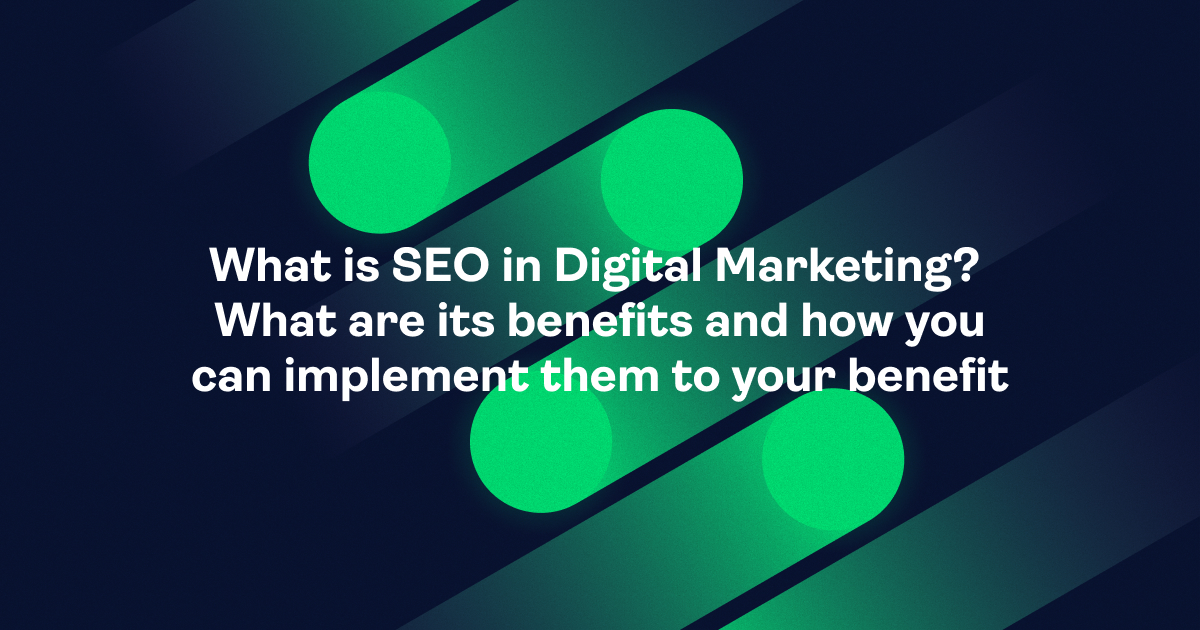
SEO · 4 minute read
Search engine optimization, commonly known as SEO, is a digital marketing strategy that aims to increase the number of people who find your website, post, or other digital content through search engines. The higher your search engine optimization score is, the more likely it is that prospective customer who are looking for information will find you. Google has been the leading search engine company in the world ever since its launch in 1996. In addition to being a dominant presence online and having access to an enormous amount of user data (including anything Google users have searched for over the last few years), Google’s algorithms are constantly changing and improving how they determine which websites and web pages should appear at the top of a user’s search results. In this blog post, we'll discuss everything you need to know about Search Engine Optimization or SEO in Digital Marketing.
Search engine optimization is a process through which you optimize your website to improve its ranking on search engine results pages. When users search for products or other information on a website, they look at the different web pages that are linked to Google’s search engine. To appear on those pages, you’ll need to improve your website’s “organic” (i.e., “un-paid”) ranking in Google’s search engine results. Organic ranking is a key factor in Google’s algorithm, as it determines which website you see at the top of your search engine results. It’s worth noting that the organic ranking isn’t measured by how many times a webpage has been clicked on, but by how many relevant queries a webpage receives from Google’s search engine.
The recipe for SEO success is a bit more complicated than just adding some keywords to your website. SEO's success depends on many factors that you'll need to keep in mind if you want to boost your site's ranking in Google's search engine results. First things first: you need to build a quality website that's optimized for Google's search engine algorithm. Your website's content is critical to SEO success, but only if it's relevant, helpful, and well-written. Second, you'll need to add proper keywords, synonyms, and other relevant keywords to your site's meta tags, title tags, and other page elements. Third, you'll need to optimize your website's content. This includes making sure that the content is the right length, written in the right format, and using the right words. Finally, you'll need to leverage SEO's built-in advantages, such as Google's ability to understand the context and the fact that Google is the leading search engine worldwide.
There's a lot more to SEO than adding some keywords to your site's meta tags and hoping for the best. You'll need to invest the time and effort necessary to get your SEO strategy up and running, but once you do, it'll result in an exponential increase in the number of visitors to your website. To begin, you'll need to decide on the industry you're in and identify any key competitors in your field. Next, you'll want to identify your target audience and understand their behaviour and needs. With this information, you can create a relevant and appealing brand and marketing strategy that will resonate with your users. For help and advice on creating a proper strategy feel free to contact our team of experts to get started!
The benefits of SEO in digital marketing vary depending on the industry, but generally include the following: - Increasing the number of people who find your company - People often turn to search engine results pages to get their information, which means that more people finding your site means more potential customers. - Increased traffic - As mentioned above, the more people who visit your site, the more likely it is that they'll stick around and conduct business with you. - Improved brand recognition - The Google algorithm works to deliver the best content, which means that the more relevant your website is to prospective customers, the more likely they are to visit your site. - Increased site authority - Google uses several different signals to determine which sites are the most authoritative and which authoritative sites rank better in the search engine results. Authority signals are one of these factors.
SEO is a core part of every digital marketing strategy, and the process is more complex than simply adding some keywords to your site. Once you get your SEO strategy up and running, it's likely to result in an exponential increase in the number of visitors to your site, increasing the amount of revenue you generate. There's a lot more to SEO than simply adding some keywords to your site's meta tags and hoping for the best. You'll need to invest the time and effort necessary to get your SEO strategy up and running, but once you do, it's likely to result in an exponential increase in the number of visitors to your site, increasing the amount of revenue you generate.